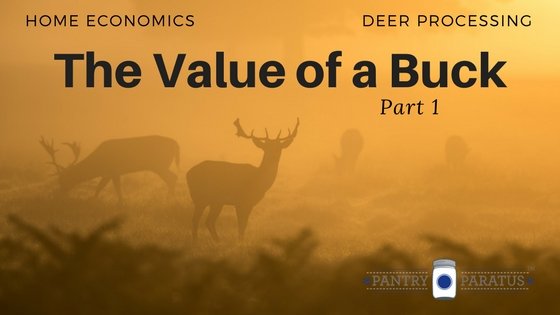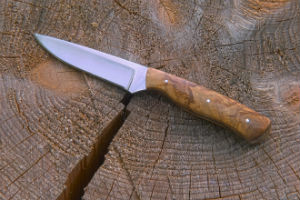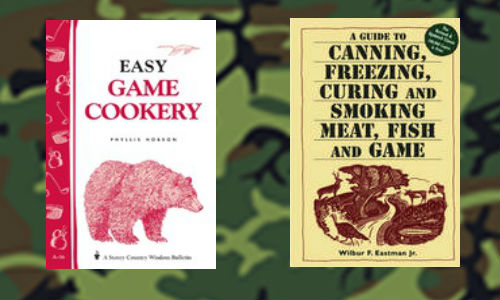
Christmas came and went this year with splendid simplicity and great memories with family and friends. Chaya and I took some time to pick up some books that are perpetually on the night stand throughout some of the busier parts of the year. One topic that has always been of interest to us here at Pantry Paratus is the subject of Home Economics, and so I was especially curious when I came across a tweet by Michael Pollan citing this Huffington Post article.
 People always taken such trouble to think about “should we eat that?”; of course if you have ever read Omnivore’s Dilemma by Michael Pollan, you will notice that this question is precisely the thesis of his book. Not long ago, I read Gut it, Cut it, Cook it, The Deer Hunter’s Guide to Processing and Preparing Venison by Eric Fromm & Al Cambronne. It seems that these two gentlemen capture the whole process from taking quarry to meat in the freezer or steaks on the dinner table. The book is not a cookbook in disguise, rather a collection of wisdom from generations of hunters who know where to place the shot, how to field dress the animal and then butcher it when back at home all because they like to see venison next to mashed potatoes.
People always taken such trouble to think about “should we eat that?”; of course if you have ever read Omnivore’s Dilemma by Michael Pollan, you will notice that this question is precisely the thesis of his book. Not long ago, I read Gut it, Cut it, Cook it, The Deer Hunter’s Guide to Processing and Preparing Venison by Eric Fromm & Al Cambronne. It seems that these two gentlemen capture the whole process from taking quarry to meat in the freezer or steaks on the dinner table. The book is not a cookbook in disguise, rather a collection of wisdom from generations of hunters who know where to place the shot, how to field dress the animal and then butcher it when back at home all because they like to see venison next to mashed potatoes.
There’s something satisfying about knowing you’ve done it all yourself—from pulling the trigger to washing the dishes. Plus, you’ll know exactly where that venison has been and how it’s been handled every step of the way. . . . Is it going to be effortless? No, no even after you’ve done it a hundred times. Is it worth it? Absolutely, even [after] the very first time (Fromm & Cambronne, 2009).
As it turns out people have been living off the land for millennia and sadly most of that knowledge seems to have slipped away into the oblivion somewhere between must-see-reality-TV and plastic wrapped bar coded meat packages. But we thank God for efforts like the Real Food Movement and others who are picking up new skills like gardening, canning or dehydrating when they never have done that sort of thing before. Efforts like this to reclaim those timeless skills are ultimately how perverse industrial food processes become reversed. If you like your cheese artisan-style, your bread hot and fresh from the oven, your green beans plump and full of terrior of your carefully composted backyard soil then perhaps it is time to start a New Year’s resolution worth keeping . . . becoming self sufficient in your kitchen.
It was my father who first introduced me to the shooting sports. As a kid we killed lots of paper targets, but it was not until I was much older that I read books on hunting and sought out the advice of hunters to bring me into “the know” on how venison ends up next to mashed potatoes. When a consumer makes the quantum leap of the true value of meat, it is one of the more clarifying experiences in life. When venison (what Ted Nugent calls “the sacred protein”) truly becomes valuable to the connoisseur is likely the same time you realize why our ancestors engraved the maxim regarding the value of labor into marble.

Our value of food is largely skewed. Ground beef on sale in the markdown portion of the freezer case seems like a good buy when we exchange our paper (or plastic) money for it at the checkout station at the front of the store. After all, the ground beef arrived from a processing plant which likely did not deal with the stockyard broker personally, nor with the farmer who brought it to market initially before it crossed the proverbial “1,500 food miles away.” Did that cow eat grass, have the sun on its back and drink clean water? Or did it live its existence standing in fecal soup up to its knees with a 1,000 other cows all the while being injected with potent pharmaceutical prophylactics for our safety?
When food becomes cheap we become sick. Things that are inexpensive generally are not thought of as being valuable and so we do not become choosy over quality rather only over price; and the modern epidemiology seems to indicate that we are all getting that for which we pay. Somehow precious metals have avoided this inversion because they can neither be printed nor successfully counterfeited—if you want silver you just have to know about chemistry, geology and of course which end of a shovel does what. Yet when the Farm Bill comes to the grocer near you the food price changes (you may be surprised to know in which direction). Take corn-fed cows which was supplemented with baking soda (actually one of the most common uses for it because corn-fed beef routinely suffer from indigestion [Ettlinger, 2007] because cows were not designed to eat corn) and the aforementioned prophylactic pharmaceuticals and you get a system that only exists because energy is “cheap” and because there is a industrial/pseudo-economic/political system in place to ensure that it stays “cheap.” Compare that view of meat with first having to track down the game, then place a clean shot, field dress it, drag it back to the truck, take it home and butcher it; the whole process becomes a lot more clarifying as to how truly valuable protein and Vitamin B12 really are in your diet.
Part 1 of 2 here was to start the discussion of the value of food, in the next blog (Part 2 of 2) we can go much deeper into discussing the practicalities of how generations past utilized all of the usable parts of the deer and made them stretch. Until then consider this quote on the coining of the colloquial term we use to describe the US Dollar, “A few hundred years ago, deer hides went for a dollar apiece. That’s where the expression ‘a buck’ comes from. Unfortunately, prices have not kept pace with inflation” (Fromm & Cambronne, 2009).
Wilson
Pro Deo et Patria
NOTE: We do not sell “Ominivore’s Delimma” or “Gut it, Cut it, Cook it,” although we recommend them. We do sell other books that we highly recommend on the subject, so be sure to browse our “How-To” section!
Photo Credits:
Deer Processing (Knife on Tree Trunk) by Count http://www.rgbstock.com/photo/nhg94q8/handmade+knives
Labor quote in marble by Pantry Paratus
Book Titles by Storey Publishing
Works Cited:
Fromm, E., & Cabronne, A. (2009). Gut it, cut it, cook it; the deer hunter’s guide to processing & preparing venison. (p. 5). Iola: Krause. DOI: www.krausebooks.com
Ettlinger, S. (2007). Twinkie, deconstructed, my journey to discover how the ingredients found in processed foods are grown, mined (yes, mined), and manipulated into what a. (First printing, March 2007 ed., Vol. 1, p. 151). London: Hudson st Pr.
Fromm, E., & Cabronne, A. (2009). Gut it, cut it, cook it; the deer hunter’s guide to processing & preparing venison. (p. 144). Iola: Krause. DOI: www.krausebooks.com
Proviso:
Nothing in this blog constitutes medical advice. You should consult your own physician before making any dietary changes. Statements in this blog may or may not be congruent with current USDA or FDA guidance.


Interesting article. But you might want to edit “terrior” to “terroir.”